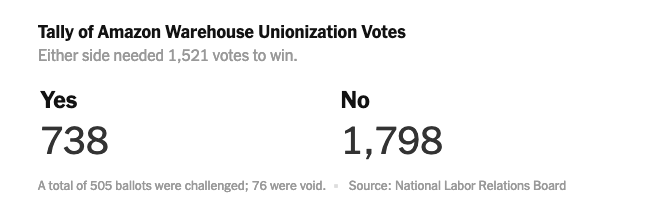The media brought their preconceived notions and biases to the #Amazon union fight (all the while parroting the union& #39;s talking points) without actually asking the *workers* themselves what they wanted... Then the NLRB actually asked them. The result? https://www.nytimes.com/2021/04/09/technology/amazon-defeats-union.html">https://www.nytimes.com/2021/04/0... 1/15
This lopsided tally is probably shocking if, for example, you had been reading @kyweise & @mcorkery5& #39;s coverage of the #Amazon union drive in @nytimes or heard their completely one-sided episode on #Bessemer on The Daily last week: https://pca.st/5g74z5g3 ">https://pca.st/5g74z5g3&... 2/15
To be clear, the pro-union skew isn& #39;t unique to the NYT - see: @NewYorker ( https://bit.ly/3taR11m );">https://bit.ly/3taR11m&q... @NPR ( https://n.pr/2OyWqAc );">https://n.pr/2OyWqAc&q... @washingtonpost ( https://wapo.st/2PJy5bI );">https://wapo.st/2PJy5bI&q... @NewsHour ( https://to.pbs.org/2RcVFxF ),">https://to.pbs.org/2RcVFxF&q... etc. 3/15
How are they skewed? Union claims are taken at face value, while the statements/actions of Amazon are greeted w/ skepticism, or suspicion. Moreover, pro-union voices are central in these stories, while opposing voices are either completely absent, or largely dismissed. 4/15
For example, many of these outlets unquestioningly accepted RWDSU& #39;s claim that over 2000 workers (more than 1/3 of employees) in #Bessemer signed cards in support of the union, even though unions frequently exaggerate their level of support via the card collection process. 5/15
Many of these outlets also prominently featured pro-union organizer/ #Amazon worker Darryl Richardson in their stories. Some of them noted he had been in a union earlier in his career; none of them revealed he had been the *chairperson* of UAW Local 2083 as recently as 2019. 6/15
These journalists also demonstrated a curious lack of skepticism about the #Bessemer union& #39;s "origin story" - i.e., that a small handful of concerned #Amazon workers came together, Googled the RWDSU, and it somehow snowballed from there! 7/15
It strains credulity to believe the organizing effort in #Bessemer was grassroots; more likely, it was an intentional, well-planned effort by RWDSU & AFL-CIO, who threw a huge amount of time & capital into what was a national campaign that drew widespread attention. 8/15
The #Amazon center in Bessemer only recently opened, it had a majority Black workforce, public support for essential workers is high, the unions could (cynically) try to tie the effort to the broader BLM/George Floyd movement - all of this seems too perfect, too calculated. 9/15
Meanwhile, these news outlets invariably portrayed #Amazon& #39;s anti-union campaign as "aggressive," as if the union& #39;s campaign - which featured Hollywood celebrities, professional athletes, a Bernie cameo, and the President of the United States - was somehow not. 10/15
The point isn& #39;t unions = bad, #Amazon = good; it& #39;s that the journalists covering the organizing effort either told the story they wanted to tell, or the story they thought their audience wanted to hear - NOT the story that was actually happening on the ground. 11/15
In the end, the union couldn& #39;t even get 30% of the vote. Yet it& #39;s actually worse than that b/c almost half of the workers didn& #39;t even participate (speaks volumes in itself). The 738 people who voted "Yes" for a union represented only 12.5% of the workers in Bessemer. 12/15
Of course, the union claims #Amazon threatened & intimidated, but this ain& #39;t the 1920s. The process is controlled by the NLRB, it& #39;s a secret ballot, workers had an entire month to mail in their votes. If they couldn& #39;t get the votes, they never had them. 13/15
But instead of presenting the muddy, nuanced facts, the news turned this into an archetypal "evil corporation vs. lowly workers" story, while ignoring the views/opinions of the vast majority of workers who, it turns out, didn& #39;t want what the union was selling. 14/15

 Read on Twitter
Read on Twitter






